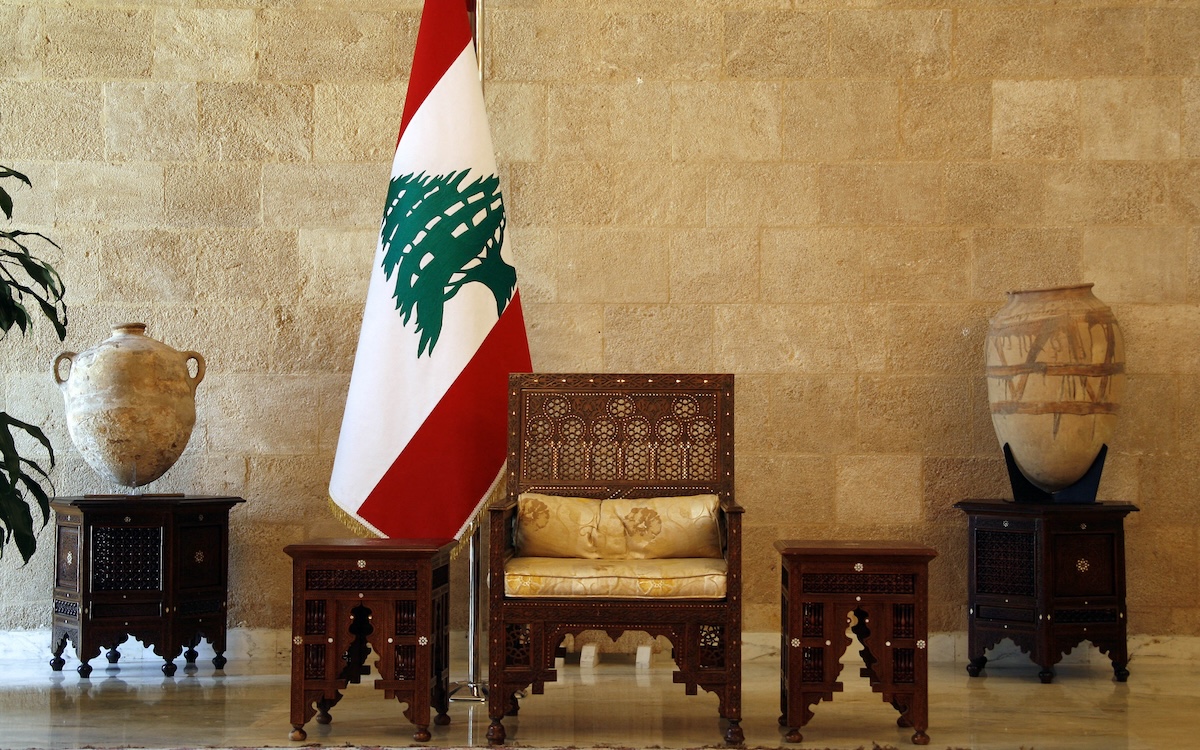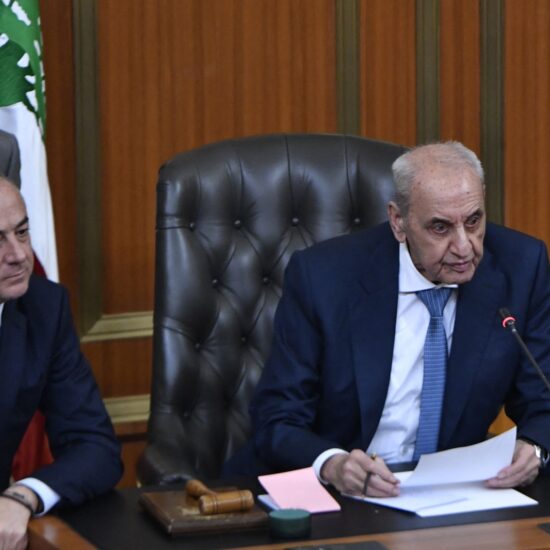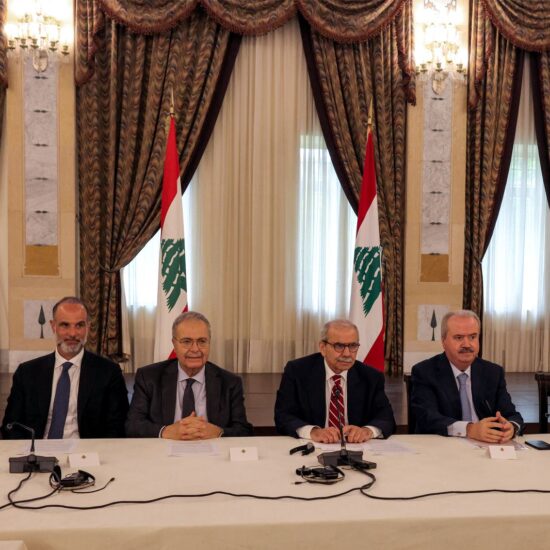
When Michel Aoun was elected President of the Lebanese Republic in 2016, Lebanon had been without a president for over two years. He had finally filed the vacuum.
However, after Aoun left office in October 2022, a new vacuum was formed as, once again, the political class are unable to agree on who should be the next president.
As of tomorrow, October 31, Lebanon will be without a president for one year.
For practically all of 2023, the main topic taking place in political circles has been the need to elect a president.
The head of General Security is leaving office and a new one needs to be chosen. Lebanon needs to elect a president first to do that. The Governor of the Central Bank is leaving office and a new one needs to be nominated. Lebanon needs to elect a president first to do that. The head of the army’s term is coming to an end soon and a new chief of staff needs to be selected to succeed him. Lebanon needs to elect a president first to do that. Economic reforms need to be passed so that Lebanon can finally start to recover from the economic crisis. Lebanon needs to elect a president first to do that. The current government is only in the caretaker capacity and a new prime minister needs to be tapped to form a government. You guessed it. Lebanon needs to elect a president first to do that.
Nothing has been done because there is no president (that is the excuse that the political class uses even though there are legal experts and scholars who argue that the Lebanese government can act in a fairly normal capacity given the prolonged period Lebanon has been without a government).
No one is talking about the need to elect a president anymore though. Focus has shifted entirely to the war in Gaza and the possibility that it could spill over into Lebanon as Hezbollah and Israel trade blows in South Lebanon.
It makes sense why this has become the focus. A war in Lebanon would devastate the country even more. In 2006, when a war unexpectedly broke out between Hezbollah and Israel, Gulf dollars came flowing into Lebanon to help rebuild the country and get it back on its feet again. That is no longer the case, and the Gulf countries have mostly tried to wash their hands of Lebanon.
But even with all of this going on, the need to elect a president remains. There is still a long list of things that need to be done and they are not going to go away just because a war is going on.
These issues cannot just fall by the wayside when something else comes up. A country cannot just stop functioning.
This war could last weeks or even months and, if things continue as they are, it could be months until there is talk once more about the need to elect a president. One can only hope that the country will not be in an even worse position when the politicians decide that they should get around to finally talking about electing a president again.
In Lebanon
Blow for blow: As the war in Gaza has continued, so have the clashes between Hezbollah and Israel in the South.
In today’s clashes on the #Lebanon–#Israel border, #Hezbollah took credit for targeting several Israeli military sites with Israel responding the outskirts of villages – including Chihine, Mays al-Jabal and as far north as Naqoura. #حزب_اللہ #لبنان #إسرائيل pic.twitter.com/V9ZMjsq6tH
— Nicholas Frakes | نيكولاس فريكس (@nicfrakesjourno) October 28, 2023
The fighting, however, has been somewhat light in comparison to the fighting that has taken place in the past, with only a few flare-ups here and there that have raised concerns about a full-scale war breaking out. Caretaker Prime Minister Najib Mikati also visited Lebanese troops in the South on October 24.
The three weeks of bombings have already displaced thousands of people, and Israel has taken to burning down the forests in the South to prevent Hezbollah and its allies from having places to hide.
آثار الحرائق التي تسبب بها القصف الاسرائيلي بالقنابل الفسفورية والحارقة على المنطقة الحرجية بين #علما_الشعب و #الناقورة في قضاء صور والذي أتى على مساحات واسعة من اشجار السنديان والصنوبر والبطم والكثير منها معمر #لبنان #جنوب_لبنان #صور pic.twitter.com/0a2QSjgVod
— Green Southerners الجنوبيون الخضر (@GreenSoutherns) October 28, 2023
With Israel starting its ground invasion of Gaza, this fighting is not going to let up anytime soon and, in reality, is likely going to get worse.
Out from the shadows: After nearly a month since the war in Gaza began, Hezbollah Secretary-General Hassan Nasrallah is set to make his first public appearance in a speech on Friday, November 3.
#Hezbollah SG Hassan #Nasrallah will speak for the first time since the war in #Gaza started on Friday.
Nasrallah’s speech will set the tone for the war for #Lebanon and whether or not Hezbollah will launch a full-scale war with #Israel. #لبنان #حزب_الله #غزة #نصر_الله #إسرائيل
— Nicholas Frakes | نيكولاس فريكس (@nicfrakesjourno) October 29, 2023
For weeks people have been wondering why Nasrallah has been silent since the war started. Now that he is to make an appearance, though, there are tensions as to what he might say.
Neither Hezbollah nor Israel seem particularly interested in starting a war, but Hamas has expressed disappointment at the limited response and support Hezbollah has given during this time, putting pressure on Hezbollah to do more.
Nasrallah’s speech will set the tone for the war in the South going forward and will do a lot to determine the extent of Hezbollah’s war in the conflict.
Please stop: A petition circulating online calling for Lebanon to be left out of the Israeli war in Gaza has garnered nearly 9,000 signatures as tensions remain over the possibility that Lebanon could unwillingly get dragged into the conflict.
A vast majority in Lebanon have expressed support and solidarity with the Palestinian people as they fight the Israeli occupation, but many of those same people have expressed a reluctance for Hezbollah – and by extension Lebanon – to get directly involved.
In the end, it will be up to Hezbollah whether or not Lebanon gets involved in the war which many have highlighted as a fundamental issue in that the Lebanese government does not have a monopoly on violence – such as when and if to declare war.
Targeted: Following the death of Reuters journalist Issam Abdallah and the injury of several others after an Israeli bomb struck their position while they were filming in South Lebanon, Reporters Without Borders (RSF) investigated the incident.
🔴 ENQUÊTE VIDÉO : RSF dévoile une enquête sur la mort du reporter de @Reuters Issam Abdallah au Liban, à la frontière avec Israël : le véhicule des journalistes a bel et bien été ciblé alors qu’ils étaient clairement identifiables comme journalistes.👇 pic.twitter.com/C9952xpH36
— RSF (@RSF_inter) October 29, 2023
In their report, RSF confirmed what practically every journalist in Lebanon already knew: Abdallah and all of the other journalists that day were targeted, even though they clearly marked themselves as journalists.
This is not the first time that Israel has done something like this. Last year, Israeli forces shot and killed Al-Jazeera reporter Shireen Abu Akleh despite the fact that it was clear she was a journalist. It was not until months later that Israel finally acknowledged the killing, but still denied that it was on purpose.
The killing of Abdallah also harkens back to the end of Israel’s occupation of South Lebanon when they blew up the car that Abed Takkoush was sitting in. Takkoush was a driver and news assistant for BBC journalist Jeremy Bowen who had gotten out of the car to do a piece on camera for a report he was doing on the Israeli withdrawal. Bowen and Takkoush were clearly not a threat and were clearly journalists, but they were still targeted.
Israel is unlikely to face any consequences for Abdallah’s death.
Evicted: Former Nissan executive Carlos Ghosn and his wife have been ordered to vacate their $19 million luxury apartment in the Achrafieh neighborhood of Beirut.
Ghosn took up residency in Beirut after he fled Japan after he was charged with a multitude of financial-related crimes.
According to the court, the property is owned by a Lebanese company and the Ghosns were, in effect, trespassing.
Ghosn has filed an appeal to the verdict.
In the region
The next stage: Israel started its ground invasion of Gaza over the weekend in the highly anticipated second stage of their offensive on Gaza.
So far, Israel has been moving slowly during its incursion, only around a hundred meters per day, as its forces work to avoid boobytraps and ambushes by Hamas forces in the area.
The air assault on Gaza continues and the bombings, according to locals, have been indiscriminate, with Gaza’s health ministry announcing that over 8,000 people have been killed so far with the majority of them being civilians.
The death toll will only increase in the weeks and months that Israel wages its ground campaign.
Shut off: As Israel began its ground incursion, Gaza became cut off from the rest of the world.
The internet and cellular services for the area were shut off, giving those living under the bombs little to no ability to communicate with each other – much less with the rest of the world.
By Sunday, some services had returned to Gaza.
Elon Musk said that he would provide Starlink satellite services to people in Gaza, but he added that he would coordinate with the US and Israel before doing anything. Israel, which shut off internet access in Gaza in the first place, has said that it will not allow Starlink into Gaza.
An unimaginable loss: Since the start of Israel’s assault on Gaza, entire families have been killed. Journalists have not been spared from this pain.
While reporting on air, veteran Al-Jazeera journalist and Gaza bureau chief Wael al-Dahdouh received news that a bombing that he had reported on earlier had killed his wife, son, daughter and infant grandchild.
Soon after, videos of him at the hospital finding his family flooded social media.
In less than 24 hours, al-Dahdouh, refusing to stop reporting on all of the other families who were losing loved ones, was back on the air.
Pushback: After two dozen attacks on US bases in Iraq and Syria, the US conducted air strikes against two bases belonging to the Iranian Revolutionary Guard Corps (IRGC) and affiliated militias.
With Israel fighting with Hamas in Gaza and also dealing with Hezbollah bombs in the north, Iran has looked to ratchet up pressure against the US as it continues to support Israel in the war.
Iran, for its part, has said that it is not looking for a larger regional war.
However, Iran is unlikely to sit idly by and not put pressure on the US in the region as it looks to expand its influence.
Another Iranian girl dead: Armita Geravand, 16, boarded the subway in Tehran nearly a month ago with her hair uncovered. In the video that circulated online, she then appeared to collapse, falling out of the train. She then fell into a coma. On October 28, her death was announced.
Iranian authorities said that she fell and hit her head because she became light-headed from not eating, but others were quick to argue that the more likely scenario was that she was attacked by the country’s morality police.
Geravand’s death is eerily reminiscent of that of Jina “Mahsa” Amini’s death in September 2022 when she was detained by the morality police and ended up in a coma, only to die soon after.
The main difference this time is that there has been no widespread protesting in Iran after the government brutally cracked down on the nationwide demonstrations last year, killing hundreds and imprisoning thousands.
What we’re reading
Making preparations: With the possibility of war around the corner, this has put Lebanon’s medical sector in a tough position. Hugely affected by the economic crisis, NOW’s Robert McKelvey wrote about the preparations taking place in the event that a war does occur.
From bad to worse: War is never good for an economy. It shrinks it and any possible growth is instantly destroyed. Maan Barazy looked at how Lebanon’s economy will be even more heavily affected given the ongoing economic crisis should a war break out in the South.
The hidden victims: Almost every facet of life in Lebanon has been affected by the economic crisis. Rodayna Raydan brought up one that often goes unnoticed: the trees.
What was shall be: If one does not know history, they are doomed to repeat it. The American University of Beirut is looking to avoid that mistake by hosting a new series that analyzes Lebanon’s history and use that to discuss what Lebanon’s possible future could look like as well as maybe what it should look like.
Hubris: The question on many people’s minds following Hamas’s attack on Israel that killed 1,400 people is; how did they do it without Israel knowing? The New York Times’s Ronen Berman, Mark Mazzetti and Maria Abi-Habib at least have an initial answer: Israel became overconfident.
Lebanon+
Podcasts: Ronnie Chatah and The Beirut Banyan are spoiling us this week with not one but two new episodes. The first is with Fadi BouKaram where they discuss Ireland’s perception of what is happening in Israel and Gaza, exploring multiple narratives and preserving one’s principles.
The second episode is with Mohamad Faour, an assistant professor of finance at AUB, where they talk about the de-development of Lebanon’s economy, a retrospect of October 17 and utilizing social media to express principles without shame.
In the latest episode of Sarde after dinner, Médéa and Mouin sat down with Ralph Baydoun and Jad Shahrour, communications experts, to talk about the media coverage of the war in Gaza, misinformation and disinformation and the murder of Issam Abdallah.
Until next week, follow NOW Lebanon on Twitter, Instagram, Facebook, and LinkedIn. And free Palestine!








